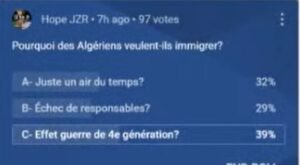Introducing the Guest and the Survey
Part 1:
How can the immigration of Algerians be explained historically and sociologically? General immigration statistics
Part 2:
– Who are the “harragas”? What are the reasons or causes that lead them to leave? Asylum application statistics
– Don’t the networks that glorify the “harga”, the dream merchants who wave mirrors to young people obey a precise agenda of destabilization?
– Are the recipient countries of this immigration with visa restrictions not responsible for this situation?
– Concerning academics, brain drain, isn’t this a legitimate need to develop their skills and intellectual development? How can this serve the country? Legal immigration statistics
HOPE NEWS
Part 3:
6- Isn’t the impact of information (misinformation) important on the desire to leave? Some Economic Indicators of Algeria
7- What should be the role of the state and civil society to improve the situation and give more readability to true information?
8- What concrete solutions to put young people, potential harragas, in project in their country?
Survey analysis
Rabeh Sebaa is a professor of sociology and linguistic anthropology. Essayist, novelist and columnist, he is the author of several books, essays, chronicles, stories, short stories and the first novel in the Algerian language, Fahla, written simultaneously in both spellings, Latin and Arabic.
Among his latest works, The social sciences in Algeria between expressive constraint and cognitive requirement, Over Algerias, Algericides, chronicles of a worried country, Exchanges, writers talk about Algeria, the moist city, the steps of destiny, my share of freedom….
He directed the projects Languages and cultures in the Maghreb, crowned by two works, Arabization in the social sciences (Editions l’Harmattan, Paris-Montréal) and Algeria and the French language or alterity in sharing, (Editions Frantz Fanon). The Algeria in the Mediterranean project, crowned by Algeria, the third shore in the Mediterranean. (Confluences-Mediterranean, Harmattan)
Founder of the review Confluences-Algeria, he currently directs the social science review Socialités et Humanités.
He has several publications in international journals and regularly collaborates with the national press as a columnist and/or contributor in several other forums. He gives several seminars on languages and regularly leads writing workshops. He pays, above all, a very attentive listening to all the cultural vibrations to all the literary, poetic and artistic pulses of Algerian society.






